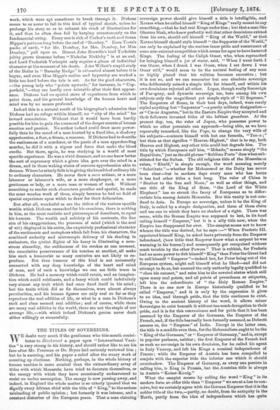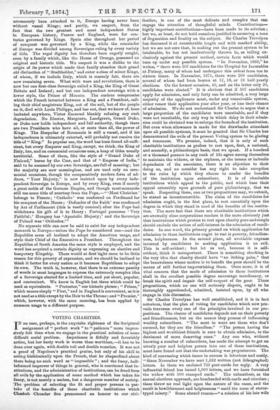THE TITLES OF SOVEREIGNS.
WE doubt very much if the gentleman who this month contri- butes to Blackwood a paper upon "International Vani- ties" is very strong in his history, and should rather like to see his face after Mr. Freeman or Dr. Bryce had seriously reviewed him ; but he is amusing, and his paper a relief after the weary work of counting up elections. Nothing, perhaps, in the whole history of human vanities is more comical than the extraordinary array of titles with which Monarchs have tried to decorate themselves, or the energy with which they have occasionally endeavoured to resist an undue assumption. The energy is now passing away, and indeed, in England the whole matter is so utterly ignored that we dignify every African chief with the title of "King," to the serious misleading of public opinion ; but formerly it was intense, and a constant disturber of the European peace. That a man claiming
sovereign power should give himself a title is intelligible, and Xerxes when he called himself "King of Kings" really meant to say something,—that he had real Kings under him ; but that a man like Ghorum Shah, who knew perfectly well that other dominions existed than his own, should call himself "King of the World," or that Xerxes himself should style himself "the Supporter of the World," can only be explained by the restless inner pride and resentment of some non-existent competition which seems for ages to have haunted Kings. The feeling of the Caliph Omar, who, when reproached for bringing himself a jar of water, said, " When I went forth I was Omar, when I drank I was Omar, when I sat down I was Omar still," would seem to be the natural feeling of any man so highly placed that his volition becomes executive ; but it is not so, and we can remember but one absolute sovereign who deliberately coined a simple title for himself, and within his own dominions rejected all other. Lopez, though really Sovereign of Paraguay, and dynastic sovereign too, bore among his own subjects only the magnificent yet simple style of "El Supremo."
The Emperors of Rome, in their best days, indeed, were rarely styled anything but "Imperator "—a purely military designation—
or " Cmsar Augustus," but in the Eastern Empire they accepted and their followers invented titles of the loftiest grandeur. At the present day, too, the ruler of Japan, who possesses power to which no other potentate can approach—being able, as we have repeatedly remarked, like the Pope, to change the very wills of his subjects—contents himself with but one formula, "Ten-o ;" but then as that signifies "Heaven-Highest," that is to say, both Heaven and Highest, any other title could but degrade him. The title by which Europeans call him, "Mikado," means simply "the Royal Gate," just as the old phrase "Sublime Porte" does when sub- stituted for the Sultan. The old religious title of the Mussulman rulers, "Khalif," is simple enough, the word meaning merely "Substitute "—whether for Mohammed or the Deity has never been clear—but in modern days every man who has borne it has had other titles a foot long. The ruler of China is "Brother to the Sun and Moon," as well as other things, and one title of the King of Siam, "the Lord of the White Elephant" has so struck the fancy of Europeans as to differ- entiate him among Asiatic Monarchs. But this vanity is not con- fined to Asia. In Europe no sovereign, unless it be the King of Italy, is called by a simple designation, and three of them claim and use one to which they have no shadow of a right. There was sense, while the Roman Empire was supposed to last, in its head calling himself " Emperor," but it is a silly title now, when the Empire has disappeared for ever. The essayist seems not to know whence the title was derived, for he says :—" When Frederic III. appointed himself King, he asked leave privately from the Emperor beforehand, (how little that Emperor knew what a serpent be was warming in his bosom!) and consequently got recognised without much trouble by the other Powers." That is rubbish, for Frederic had no more power to dub himself "King" than Peter the Great had to call himself "Emperor "—indeed less, for Peter being out of the European system, might call himself what he liked—and did not attempt to do BO, but coerced the only authority legally qualified to "close his coronet," and raise him to the coveted status which still upon many real points, and all points of precedence or etiquette, left him the subordinate of "the Holy Roman Empire."
There is no one now in Europe historically qualified to be called "Emperor," and it is only by the expression it gives to an idea, and through pride, that the title continues to exist.
Owing to the ancient history of the word, it allows minor Sovereigns to exist beneath it without too much derogation to their pride, and it is for this convenience and for pride that it has been assumed by the Emperor of the Germans, the Emperor of the French, and, if the title has really been formally assumed, as Debrett assures us, the " Empress " of India. Except in the latter case,
the title is a muddle even then, for the Hohenzollern ought to be the ‘. King of the Germans," or " Emperor of Germany," and is, except
in popular parlance, neither ; the first Emperor of the French had as such no sovereign in his own dominion, for he called his agent in Italy Viceroy, and left his Kings a nominal independence of
France; while the Emperor of Austria has been compelled to conjoin with the superior title the inferior one which it should overshadow. The Emperor of Germany, as every one persists in calling him, is King in Prussia, but the Austrian title is always in Austria " Kaiser-Konig."
What the essayist means by calling the word "King " in its modern form an older title than "Emperor " we are at a loss to con-
ceive, but we certainly agree with the German Emperor that it is the nobler title of the two,—partly, no doubt, from its antiquity in the North, partly from the idea of independence which has quite
erroneously been attached to it, Europe having never been without vassal Kings; and partly, we suspect, from the fact that the two greatest and most independent States in European history, France and England, were for cen- turies governed by Kings. Spain also throughout her period of conquest was governed by a King, while the remainder of Europe was divided among Sovereigns ruling by every variety of title. The regal dignity has therefore been eagerly sought, even by a family which, like the House of Orange, possessed an original and historic title. We suspect it was a dislike to the origin of its power which made that family abandon their grand old distinction of " Stadtholder," and enter a class of minor Kings, of whom, if we include Italy, which is scarcely fair, there are now remaining seven. What with wars and revolutions, there is now but one first-class Sovereign called a King, the King of Great Britain and Ireland ; and but one independent sovereign with a lower style, the Prince of Mouaco. The curious compromise which the French invented between a King and a President, call- ing their chief magistrate King, not of the soil, but of the people on it, died with Louis Philippe, and has not, that we know of, been imitated anywhere, Victor Emanuel blankly refusing any such degradation. No Elector, Margrave, Landgrave, Grand Duke, or Duke now holds independent and full authority, though there are two Presidents who have all, or more than all, the power of Kings. The Hospodar of Roumania is still a vassal, and if his independence is ultimately extorted, will probably not receive the title of "King." In popular use, the word has been found all-suffi- cient, but every Emperor and King, except, we think, the King of Italy, has, and on ceremonial occasions uses, a heap of titles usually territorial. Some of them, like the style of "Grand Duke of Finland," borne by the Czar, and that of "Empress of India," said to be assumed by our own Sovereign, are full of meaning ; but the majority are now meaningless, and are used only on cere- monial occasions, though the comparatively modern form of ad- dress, " Your Majesty," is now insisted upon by every inde- pendent Sovereign in Europe, and by every King, even if merely a great noble of the German Empire, and though most monarchs still use some title of courtesy from the Pope,—" 'Most Christian' belongs to France ; 'Catholic' was conferred on Ferdinand for his conquest of the Moors ; 'Defender of the Faith' was confirmed by Act of Parliament (this is vastly comical) after the Pope had withdrawn his gift of it to Henry ; Portugal possesses Very Faithful;' Hungary has 'Apostolic Majesty;' and the Sovereign of Poland was 'Orthodox."
No separate title can now be said to exist for any independent monarch in Europe—unless the Pope be considered one—and the Republics seem all inclined to adopt the American usage, and style their Chief of the Executive a President. Throughout the Republics of South America the same style is employed, and the word has acquired a certain dignity as expressing an elective and temporary Kingship. There would at first 'sight seem to be little reason for this poverty of expression, and we should be inclined to think it better for every nation as it becomes Republican to adopt its own. The truth is, however, that there is an extreme paucity of words in most languages to express the extremely complex idea of a Sovereign elected for a limited time, and yet short, popular, and convenient. We know in English but three which could be used as equivalents. "Protector," our historic phrase; "Prince," which means simply "First," and in England is convenient, as it is not used as a title except by the Heir to the Throne; and "Premier," which, however, with the same meaning, has been applied by common usage to a different purpose.



































 Previous page
Previous page